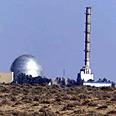
IAEA rejects Arab move targeting Israel
In diplomatic victory for US, 51 delegations of UN nuclear watchdog member states vote against resolution calling on Jewish state to join global anti-atomic weapons treaty; 46 vote in favor, 23 abstain. Washington: Resolution could hurt peace process
Member states of the United Nation nuclear watchdog narrowly rejected an Arab-sponsored resolution on Friday calling on Israel to join a global anti-atomic weapons treaty in a diplomatic victory for the United States.
Washington had urged countries to vote down the symbolically important although non-binding resolution, saying it could derail broader efforts to ban nuclear warheads in the Middle East and also send a negative signal to the relaunched Israeli-Palestinian peace process.
Forty-six delegations voted in favor of the resolution, 51 against and 23 others abstained in the general assembly of the 151-member International Atomic Energy Agency (IAEA).
It had approved a similar resolution expressing concern at "Israel's Nuclear Capabilities" in a close vote at last year's General Conference, as the annual IAEA gathering is known.
Israel warned the Vienna gathering earlier on Friday that the Arab-led effort to single out the Jewish state could deal a "fatal blow" to any cooperation on improving security in the tinderbox Middle East.
"Adopting this resolution will be a fatal blow to any hope for future cooperative efforts towards better regional security in the Middle East," Israel's IAEA envoy Ehud Azoulay said, shortly before the vote.
Arab representatives said that Israel's presumed nuclear arsenal threatens regional peace and stability. The Jewish state is the region's only country outside the nuclear Non-Proliferation Treaty. Israel says it will not consider joining the NPT until there is comprehensive Middle East peace.
If it signed the NPT, it would have to renounce nuclear weaponry. Arab states say there cannot be genuine peace in the Middle East until Israel gives up nuclear weapons.
Israel has never confirmed nor denied having atomic bombs, under a policy of ambiguity to deter its Arab and Islamic foes.
Israel and the United States regard Iran as the Middle East's main proliferation threat, accusing it of seeking to develop atomic weapons in secret. Tehran rejects the charge.
- Follow Ynetnews on Facebook










